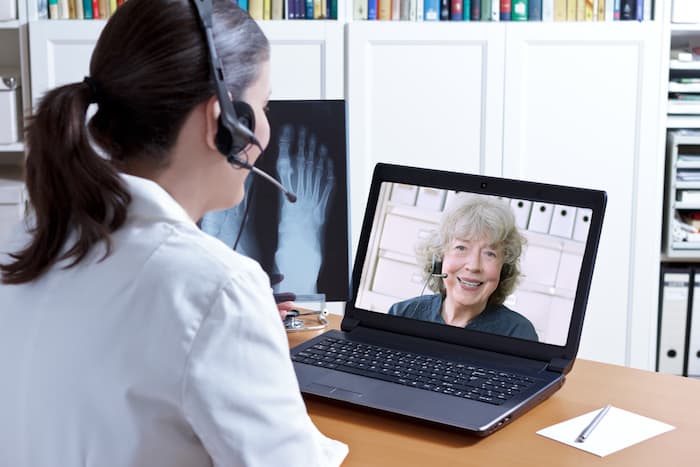For nearly one in five Americans, testing positive for COVID-19 is just the start of an unwanted journey that never seems to end. According to the CDC, about 20% of COVID-19 survivors experience long COVID, with symptoms that can easily persist from one to three months and beyond.
Researchers report that among the many challenges of long COVID, communication issues persist, including cognitive impairment, brain fog or speech and language difficulties. During recovery, individuals report that they have trouble remembering, using intended words or expressing ideas in coherent sentences. Left untreated, these issues may worsen over time.
Symptoms of long COVID are wide-ranging with examples that include:
- Cognitive impairment: Mild to severe trouble remembering, learning new things, concentrating, or making decisions that affect their everyday life.
- Brain fog: Diminished mental capacity marked by an inability to concentrate or to think or reason clearly.
- Speech and language issues: Difficulty forming specific words or sounds correctly, or making words or sentences flow smoothly, such as stuttering or stammering.
Optimizing Long COVID Recovery Training
While there is no test or formal assessment to confirm long COVID symptoms, the CDC notes that the broad spectrum of symptoms can make it challenging to know whether they are due to COVID or other health conditions and how long these symptoms may last. These symptoms also may seem hard to explain or manage when viewed through a traditional diagnostic lens. As a result, and in the absence of standard pharmaceutical treatment for long COVID, therapeutic approaches such as speech therapy are positioned as a primary means for recovery assistance.
A long COVID patient who struggles with brain fog and other communication and voice issues should see a doctor for a formal diagnosis and ask for a virtual speech therapy referral to get help in the comfort and privacy of their home. Fortunately, speech-language pathologists (SLPs) and specialized intervention plans, such as the Great Speech long COVID program, can help long COVID patients to recover verbal skills, avoid further deterioration and more confidently return to work and academic activities.
SLPs utilize a variety of approaches. For example, spaced retrieval helps patients practice recall and use of relevant information over increasing intervals of time. Patients who have difficulty speaking can sometimes utilize alternative modes of communication such as singing, allowing SLPs to introduce melodic intonation therapy as part of the treatment protocols.
Script training enables patients to work with their therapists and develop common scripts for communication needs. These activities improve sentence formation, speech rate and overall confidence. SLPs can also focus on auditory and visual cueing strategies as well as retrieval cueing approaches that aid patients in recalling the words they wish or intend to use.
Avoiding Downstream Effects
Long COVID patients who suffer from communication issues may begin to self-isolate, and develop feelings of loneliness and depression, leading to emotional and mental health concerns that exacerbate the physical, cognitive and even neurological changes they are coping with during their recovery. Communication disorders not only affect critical functioning skills, but also disrupt the quality of life that patients enjoyed prior to their COVID diagnosis.
One key element of long-haul recovery is a sense of patient support. Virtual speech therapy programs can create access to peer support and help to assure patients they aren’t alone in their journey to recovery.
Access to Virtual Speech Therapy
The pandemic introduced many people to the convenience of accessing multiple healthcare services via virtual care, also known as telemedicine or telehealth. This approach eliminates transportation issues and waiting in unpredictable public waiting rooms for appointments – which often causes concern about further exposure to COVID or other viruses. Virtual visits are also easier to fit into a busy schedule, offer more availability than in an office setting and avoid missing work or other activities.
Many people are now familiar with and prefer virtual care for their primary care appointments or access to urgent care. Now, there is another option available that enables people to address long COVID and other communications challenges: virtual speech therapy or teletherapy conducted in the comfort and privacy of home. Furthermore, with health organizations and insurers increasing access to virtual speech therapy, people are scheduling and conducting speech therapy with the additional reassurance that the services are covered when they select an in-network provider.
Criteria for Selecting a Virtual Speech Therapy Long COVID Provider:
- Ask the provider if they have a plan of care focused on Long-COVID treatment and support
- Look for a provider that offers a dynamic solution such as ‘synchronous’ one-on-one engagement with the speech therapist, as well as a practice portal for ‘asynchronous’ learning capabilities that allow patients to practice at their own pace.” These capabilities extend the opportunities for continued advances following each visit.
Prognosis for Long COVID
As of January 25, 2023, Centers for Disease Control and Prevention (CDC) data show that COVID cases, deaths, and hospitalizations have stabilized after a small surge around the holidays. The caveat is that there is still a great deal of uncertainty about long COVID and whether there will be increased long COVID cases.
Looking ahead, 5% of the adult population is struggling with activity limitations that result from long COVID. For these individuals, virtual speech therapy is a valuable and proven approach to overcoming communication issues and taking important steps toward complete recovery.

Avivit Ben-Aharon
Avivit Ben-Aharon, MS ED., MA CCC SLP is the Founder and Clinical Director at Great Speech, Inc, a virtual speech therapy company founded in 2014. She is recognized as a trail blazer for nationwide virtual access to speech therapy, allowing anyone who is committed to improving their communication to receive expert services, regardless of location or scheduling limitations. Her work has been featured on Good Morning America, US News and World Report, Miami Herald and more. She holds an undergraduate and a Master of Arts degree in Speech-Language Pathology from The City University of New York. She earned a Master of Science in Special Education and Teaching from Hunter College. Connect with her on LinkedIn or via email: [email protected].







